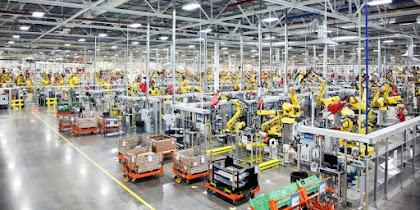Mr. Kyslinger, who grew up in western Pennsylvania and was a curveball throwing right-hander for the University of Pittsburgh, majored in computer science in college. Practice was at 5 a.m., so he got up at 3:30 and went to the computer lab.
After graduating in 1989, he went into the automotive world, where starting as a controls engineer, he spent 23 years working for Chrysler, Ford and Honda. Car companies were among the first to embrace automation, replacing humans with crude, often dangerous robots on assembly lines.
In the 1980s, robots were a rare example of the U.S. car industry's use of technology to think ahead. But in some ways, industry experts believe, they set robotics back.
'' Everything we sold was to take labor out, '' said Mr. Campbell of Universal Robots. '' Everything was to replace a worker. That was the impression, and at that point it was the truth.''
For Mr. Kyslinger, who today lives near Myrtle Beach, S.C., working for a Japanese company was a formative experience.
He admired what he saw as Japanese culture's disciplined approach to complex problems and wrote a master's thesis on the different working environments at Honda and Ford.
In 2011, Mr. Kyslinger moved to an industry trying even more aggressively to automate industrial workspaces : Food distribution.
At C&S Wholesale Grocers, the nation's largest grocery distributor, he designed a warehouse in which traveling at 30 miles per hour filled up pallets destined for supermarkets.
C&S is a little-known company that has a hand in transporting an outsize portion of America's food. [ '' If it belongs on a supermarket shelf, it's probably moving through a C&S warehouse right now, '' the New Hampshire-based company like to say.]
Under Mr. Kyslinger, C&S pioneered warehouses with so few human workers that they came close to the industry goal of ''lights out,'' meaning the ability to operate in darkness, minus human eyes.
Today Mr. Kyslinger says lights-out is ''getting really close.'' As we walked the floor of ProMat, he identified robots that were closing the gap with humans and in some cases outperform them.
'' Fear Of Our Own Creation '' : One of Mr. Kysligers's many consulting clients wandering the ProMat floor was Samuel Reeves, a roboticist from Philadelphia. Mr. Reeves now 40, began working on a company he called Humanistic Robots in the mid-2000s, shortly after he graduated from college.
It was devoted to land mine removal, the kind of extreme task that robots have long been assigned. Humanistic Robots used a construction vehicle to build a 10,000-pound mine sweeping robot that could move on its own.
'' And we are immediately terrified of it, '' Mr. Reeves said. He then founded FORT Robotics, '' born of our own creation.'' He expressed the same kind of terror and regret that artificial intelligence creators have been voicing.
FORT Robotics is a ''robotic-controlled platform,'' according to Mr. Reeves, and one of only a few companies focused on preventing robots from mauling workers, which Mr. Reeves called '' a disaster waiting to happen.''
'' In the last generation of automation, people were just really trying to get machines out there that worked,'' Mr. Reeves said.
'' There have to be huge innovations to improve safety so that machines can run autonomously and faster around humans - and at a lower price point.''
He added that ''safety-rated scanners are incredibly expensive - like $10,000 a pop.''
The World Students Society thanks author Ben Ryder Howe.

.png)


0 comments:
Post a Comment
Grace A Comment!